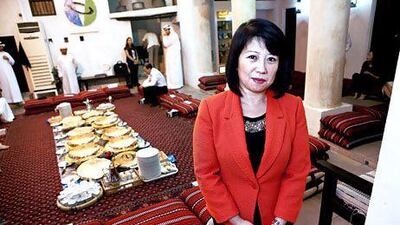China's importance as a consumer market as well as the factory of the world means interest in its languages from the business community is at a high. But the thousands of characters that constitute Mandarin make it tough for foreigners to master.
Lucy Chuang, the founder of a Chinese language learning centre in Dubai, sees a familiar pattern among her students.
"In the beginning everybody is super-excited and wants to learn the language," Ms Chuang says.
As the course moves from beginner's level to intermediate and advanced, the number of students drop off.
"It is like an inverted pyramid," she says.
And yet there is no letdown to the demand. Ms Chuang, who started the non-profit Dubai Chinese Learning Center in 2007, commenced accepting adult students in 2008. She began with private lessons for adult learners, most of them business leaders and government officials, and this month she opened group classes for adults.
"Learning Chinese would help me professionally and personally since we are expanding internationally to China," says one of Ms Chuang's students, Sarah Falaknaz, an executive director at Dubai Holding.
Ms Falaknaz is visiting China for a month in August and aspires to double her vocabulary by then.
Ties between the emirate and China have been growing. Last year, China emerged as Dubai's top trading partner. The emirate imported goods worth Dh111 billion from China, or 15 per cent of total imports. That compares with 11 per cent of the UAE's total imports in 2004.
Ms Falaknaz started learning business fundamentals about five months ago. And she says she can fluently read Pinyin, a romanised form of Mandarin. "I had the passion to learn for the past two years but no time," she says.
For busy students such as Ms Falaknaz, Ms Chuang is devising ways to help them out.
"What to teach is easy, how to teach is always challenging," she says.
Her team recently introduced an online component that enables students to seek help from the centre's teachers over the internet. It has 15 teachers.
Of the 100 students at the centre, 30 are adults in private classes. That is up from about five in 2008. Among the adults, almost 90 per cent are learning it to understand Chinese business culture.
"Culture empowers business and with globalisation culture plays an important role in terms of doing business," Ms Chuang says.
Besides time constraints, the complexity of Mandarin limits the number of advanced students. There are 5,000 to 7,000 characters that can be used in the spoken language, and a beginner is expected to learn about 700 to move on to the second stage of learning.
To be called an advanced student, one needs to master 5,000 characters. While the grammar is easy, Ms Chuang concedes that the intonation is difficult. There are four tones in Mandarin, and a slight slip changes a word's meaning.
For instance, "ma" can mean mother or horse, or be used to question or criticise someone.
The centre teaches the standard Mandarin used in Singapore and elsewhere besides mainland China.
Changing business patterns reflects the rise of Mandarin.
A little more than a decade ago Cantonese was the popular one as Hong Kong was the business hub.
"But now the world directly goes to China and language is linked to the land," Ms Chuang says.
The centre's private lessons cost Dh3,000 for 20 hours and 10 sessions. Group classes cost Dh1,800 for 12 sessions, each two hours long.
This month, Ms Chuang organised an event in Dubai's heritage district of Bastakiya with the local business community, her adult students and Chinese officials in an informal setting.
For as Confucius said:
Is it not enjoyable to learn and practice what you learn?

